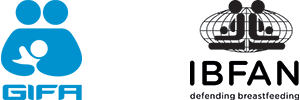
IBFAN’s Briefing: The International Code of Marketing of Breastmilk Substitutes[i] was adopted forty years ago by the World Health Assembly, the world’s highest health policy setting body. The Code, the first consumer protection tool of its kind, was the result of a struggle between civil society, health professionals and academics – all committed to the health of mothers and their children and led by the International Baby Food Action Network (IBFAN) [ii] – and baby food industries based in the world’s richest nations.
Today 70% of countries have adopted laws based on the Code, however far too many are limited in scope and full of loopholes as a result of industry interference. [iii] As a consequence predatory marketing of baby food products continues throughout the world. [iv] and the global Baby Food Drink Market is forecast to rise more than 30% in 5 years (from $68bn in 2020 to $91.5bn by 2026).
Although of smaller proportions, this struggle was, and still is, similar to the one currently being waged in the face of climate change – an immensely greater threat. Both are defending human life and health against threats posed by powerful, profit-driven forces.
Aside from its crucial role in child survival (more than 800,000 children die each year because they are not breastfed and many more do not reach their full potential [v]) breastfeeding is the most environmentally friendly way to feed an infant, resulting in zero waste, minimal greenhouse gases, and negligible water footprint. As a renewable natural food resource, mother’s milk makes an important contribution to local food and water security.[vi]
The COVID-19 pandemic has been in the spotlight for the last two years, and although it probably still holds unpleasant surprises, it has thankfully not prevented a global resumption of activism and political reaction to the climate crisis. But the baby food industry lost no time in exploiting the fear and confusion during the pandemic: falsely claiming their products build immunity; that their ‘donations’ are humanitarian; encouraging the needless separation of mothers and babies and pretending that they are essential ‘partners’ who are genuinely working to address the problems.[vii] [viii] [ix] [x]
The pandemic also caused many significant events to go unnoticed. One was the launch of the Lancet/UNICEF/WHO Commission report that concluded [xi]“… today’s children face an uncertain future. Climate change, ecological degradation, migrating populations, conflict, pervasive inequalities, and predatory commercial practices threaten the health and future of children in every country.” The report calls on governments and international agencies to take immediate action to curb these threats.
Violence is another major threat that, through armed conflict or the pernicious effects of the arms trade, takes an ever-increasing toll on children and young people.[xii] The high toll of death and disease caused by commerciogenic malnutrition continues silently, but equally lethally.
Misleading labelling, advertising, consumer manipulation, health, education and trade policies and research plagued by conflicts of interest, unsupportive hospital practices and inadequate maternity protection are among the determinants of the decline of breastfeeding rates in many countries. These factors and the early introduction of ultra-processed products contribute to rising obesity, chronic diseases and life-threatening infections [xiii]. Most transnational food and baby food companies are also complicit in the climate emergency through the promotion of food systems that undermine bio-diversity and traditional food cultures and lead to deforestation, mono-cropping, land and sea-grabbing and the promotion of a host of risky technologies.
Meanwhile they will be continuing to push for the unrestricted global trade of totally unnecessary, denatured, ultra-processed, plastic-wrapped, flavoured, additive laden and sweetened drinks for older babies at the forthcoming UN Codex meeting later this month.[xiv] WHO policy is clear that the promotion of these products undermine breastfeeding – a lifeline for babies in countries where the majority of children are breastfed in the 2nd year of life.
In this context breastfeeding stands out as a unique natural resource that has enabled humans to survive and adapt to the most diverse and challenging environments. A perfect sustainable food system that creates no waste or pollution and generates an imprint of empathy, which is the most solid foundation for the prevention of violence. In short, a powerful resource for dealing with the major threats children face from the beginning of life.[xv]
The protection of breastfeeding and sustainable complementary feeding through the full implementation of the International Code and subsequent Resolutions as law in every country is imperative. Indeed, commercial efforts to replace, limit or displace breastfeeding should be described as a form of ecocide[xvi] along with other forms of greed-driven, negligent destruction of natural resources.
CLICK HERE for IBFAN Statement online version with references
